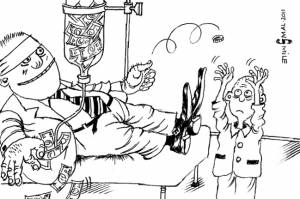Crisis with medication: action needed not just stern words

Picture from Dzerkalo Tyzhnya
Following an article by Yury Butusov in the newspaper Dzerkalo Tyzhnya reporting that NO public tenders had been held this year for purchase of medicines which are urgently needed for people suffering from haemophilia, cancer, tuberculosis and more, the Prime Minister made threatening noises about heads rolling and gave the Minister of Health one month to deal with the situation.
Responding to these words spoken by the Prime Minister at a Cabinet of Ministers meeting, Yury Butusov says that while sharp criticism of lack of medicine in a country with 45 million people should arouse sharp public response from those in power, the words of the Prime Minister and leadership of the Health Ministry make one doubt that the government will be able to resolve the problem swiftly.
The first question must be whose heads should role. How could it happen that money has been allocated for purchase of medicine, yet has sat in the coffers while the targeted public funding programmes were not implemented?
The second is why threatening noises are only being made now. There have been articles on the lack of medicine for months, and Head of the Ukrainian Haemophilia Society spoke of the crisis for haemophilia sufferers at a press conference on 15 April. People from the Haemophilia Society and other civic organizations have approached the Ministry of Health, the President’s Administration and other authorities many times.
“Thirdly, from the Head of the government one would like to head not emotions and feigned surprise, but a specific plan of action to rectify the situation and immediate supplies of medication!”
The author is scathing about instructions issued to the same Ministry to deal with a situation to a large extent of its making. The Minister, Anishchenko acknowledges the problem with medication for haemophilia sufferers but says that his Ministry carried out two tenders, however the medicines were more expensive than a year earlier, and not bought. Now they will buy them “even at the excessive price” but that this will take time. “Even if the purchases had been carried out in January”, the Minister claims, “by this stage the medication would have run out”.
Even without other motives, the Minister’s lack of understanding of the real nature of the problem and the actual state of affairs would be incredible. In fact, Dzerkalo Tyzhnya is suggesting that the situation has arisen to a large extent because of failure to agree mutually beneficial deals with pharmaceutical companies. Mutually beneficial meaning for the companies and the public officials; those who are being deprived of critical medication seem to have been left out of the officials’ calculations.
In 2011 the Ministry of Health did not make one purchase of medicines and all 240 tenders ended without any result. In 2010 3.5 billion UAH were spent on such procurement and the figure in 2011 is not less. There is money in the budget, the author writes, but it remains sitting in the State coffers. “And while those who are all set to earn on this wage an uncompromising war in the offices of power, millions of Ukrainians whom the State guarantees free vitally important medicine, receive no help.
A week later Yury Butusov provides more detail about the dire situation with tenders: of the 24 tenders that led nowhere, 25 actually did reach the stage where the bids were opened. Had the arrangements reached actually come to real purchase, money might even have been saved. They did not, with the agreements to supply medicines being broken.
Dzerkalo Tyzhnya’s attention to the subject has clearly led to a flurry of activity, at least as far as TV appearances are concerned by the Minister of Health and his deputy. Yury Butusov suggests that they avoid using inaccurate or unverified information.
For example, the “Herald on Public Purchase” makes it quite clear that there were not 2 tenders for haemophilia medication in 2011, but a full six. The Ministry rejected them all. The author states that this is “despite the achieved saving of public funding, and a significant one. All suppliers took part in all tenders for supplies of haemophilia medication.
Most importantly, not once did the prices exceed those for 2010.”
The author provides examples of particular tenders for blood clotting medicine. In two cases, he cites “sources close to the management” of particular enterprises which had successfully won tenders as saying that the supplies were blocked by the Ministry of Health and the agreement broken.
Haemophilia sufferers have never been fully provided with the medication they needed by the State, and certainly not at anything like the level of many other countries, yet the situation now is absolutely exceptional.
The Head of the Haemophilia Society is also sceptical about the Minister’s promise that medication could arrive within a month. O. Shmilo says that even if a tender is held now, the supplies are unlikely to come earlier than in two and a half months. The supplies needed now are huge, and companies are unlikely to take the risk of buying up so many supplies especially with the recent track record of broken agreements.
The situation is critical by now with medication urgently needed by people with forms of cancer, tuberculosis, HIV. The author stresses that those responsible for this mess must stop issuing false justification and trying to shift the blame. An action plan is needed here and now for emergency resolution of the situation.
Heavily cut from long reports at: http://dt.ua/articles/84976 and http://dt.ua/articles/84557 Should any organization wish to make an approach to the Ukrainian government over this issue or in any way help those suffering from serious illnesses and official corruption, full translations could be provided





